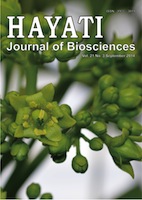Identification of Antibiotic-Resistance Genes from Lactic Acid Bacteria in Indonesian Fermented Foods
Abstract
Lactic acid bacteria (LAB) are known to have an important role in food fermentation and are thought to have health-promoting abilities such as probiotic properties. In this study, LAB were isolated from Indonesian fermented foods such as dadih (fermented buffalo milk), tempoyak (fermented durian), bekasam (fermented meat), and tape ketan (fermented glutinous rice). Those isolates were investigated for their resistance to two antibiotics: chloramphenicol and erythromycin. Recent efforts in food science have sought to identify genetic markers for antibiotic resistance within LAB strains, so that these genes can be selected for genetic modification. Such research is presently being directed toward the development of food-grade vectors (plasmid). The aim of this study is to screen LAB isolated from Indonesian traditional fermented foods, for chloramphenicol and erythromycin resistance. In this study, a total of 120 LAB samples were taken from traditional Indonesia fermented foods, and were tested for resistance to chloramphenicol and erythromycin. The results show that three LAB strains remained resistant to doses of up to 5 μg/mL chloramphenicol, while the LAB strain Lactobacillus plantarum showed resistance to the antibiotic erythromycin up to a concentration of 15 μg/mL.
Downloads
HAYATI J Biosci is an open access journal and the article's license is CC-BY-NC. This license lets others distribute, remix, tweak, and build upon author's work, as long as they credit the original creation. Authors retain copyright and grant the journal/publisher non exclusive publishing rights with the work simultaneously licensed under a https://creativecommons.org/

























.png) IPB University
IPB University Department of Biology
Department of Biology The Indonesian Biological Society
The Indonesian Biological Society 

